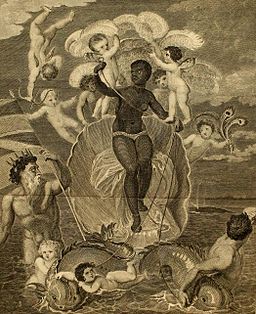ARTchivist's Notebook: Can metadata be poetry?
Can metadata be poetry?
I've been thinking a lot lately about Robin Coste Lewis' book, Voyage of the Sable Venus and other poems, in which she crafted a narrative poem out of nothing but metadata--the titles and descriptions--from works of art depicting Black women. These text-beds came from the (mostly Western) museums, libraries, and archives where the works are held, and thus form a dataset of attitudes, beliefs, and assumptions about Black women and the place they hold in our world. The poem is structured with a Prologue, two opening sections, and eight "Catalogs" that correspond roughly to different time periods, from ancient Greece and Rome to the present.
It's a beautiful, ambitious, often challenging work, as you might imagine a poem built from these sometimes terse, reductive descriptions would be. The Prologue reminded me of a cataloging guide, explaining the rules Lewis set herself for sourcing, sequencing, and altering the texts. They are lovely in their own right:
1.No title could be broken or changed in any way. While the grammar is completely modified—I erased all periods, commas, semicolons—each title was left as published, and was not syntactically annotated, edited, or fragmented...
6. Sometimes I chose to include female figures I believe the Western art world had not realized were black women passing for white.
This negotiated balance between fidelity to the original and creative interpretation not only characterizes the entire poem, it parallels the process of cataloging a visual work, which is always a balance between what the object brings to the table and what you, the cataloger, bring to the encounter. Through her highly personal, poetic lens, Lewis calls attention (although this is certainly not her main point) to the fact that metadata is kind of like a poem, or at least a record of an interaction between an object and a person. No matter how much we try to standardize and automate, there is always something subjective happening in cataloging: sometimes that interpretation is ugly or demeaning, but occasionally, maybe, it's lovely, too.
This idea kind of crystallized a few days after reading Lauren Oyler's New Yorker essay on the books of Maylis de Kerengal, in which she drops this juicy line: "...description is what allows language to transcend description." She was referring to de Kerengal's preference for unusually specific descriptions, in which highly specialized language is mixed with everyday terms and slang, and where the whole of this soup is more evocative than the sum of its parts. I haven't read de Kerengal myself, but that line about description stuck with me. It echoed something that art critic Christopher Knight once told me, that sometimes all you have to do is start describing an artwork to know what you think about it. It also sounds kind of like poetry, where the words evoke more than seems possible for simple black letters trekking across a spare white page.
Sometimes writing metadata--supplied titles, image or work descriptions, alt text--can feel more like bricklaying than writing, but it is heartening to think that our careful attention to the object, our sincere attempts to describe it, might transcend description, might help someone else experience the object in a new way, or provide an anchor to make connections farther afield. And isn't that a kind of poetry?
--
For those in LA, Robin Coste Lewis is debuting a new film and book project with Julie Mehretu and Michael Govan at LACMA on Tuesday, April 11 at 6:30pm. Maybe I'll see you there!
Image caption:
Top: Allegory Voyage of the Sable Venus from Angola to the West Indies. From The History, Civil and Commercial, of the British Colonies in the West Indies by Bryan Edwards, vol. 2 (1801). John Carter Brown Library, Public domain, via Wikimedia Commons.
Thanks for reading! If you have any comments or questions about this issue, please feel free to get in touch. Or follow me on LinkedIn.
ARTchivist's Notebook is an occasional newsletter musing on the intersection of archives, art, and social justice by me, Sharon Mizota, DEI metadata consultant and art writer.
I help museums, archives, libraries, and media organizations transform and share their metadata to achieve greater diversity, equity, and inclusion. Contact me to discuss your metadata project today.
